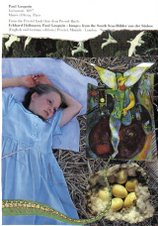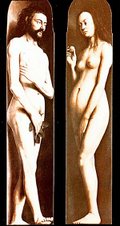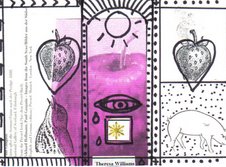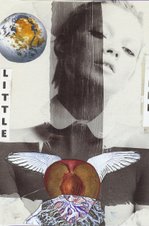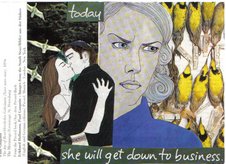The great Shirley Booth won a Tony for her performance in the original production of [Come Back Little] Sheba.
(She also won an Oscar when she reprised the role in the 1952 film.) Her Lola, however, was too sympathetic. In the movie, she comes off as a harmless busybody with a heart the size of a Whitman's Sampler; there's no strychnine in her sugar. ... what makes her ultimately odious is her complacency, her acceptance of habit, no matter how destructive. --Hilton Als, "Desperate Housewife."
The New Yorker, 2/4/08
I disagree with Hilton Als' assessment of Shirley Booth's Lola in the film version of
Come Back Little Sheba.1. First, and most of all, that she is "too sympathetic."
For anyone who has not seen the film: Lola's husband, Doc, is an alcoholic who gets drunk at the end of the film (Als calls it a "bender") and calls Lola a "slut." He also attacks her with a kitchen knife. Presumably, if Booth's Lola were more "odious," the knife attack would be more understandable. (?!)
2. Second, I must question what Als means by "too sympathetic." Does he mean "too sympathetic" in relation to Inge's original play? Inge's play seeks to put the viewer in sympathy with Doc. Inge, himself an alcoholic, apparently believed that an alcoholic's partner should "understand" the alcoholic and be an unquestioning participant in the alcoholic's life. Even, apparently, to the point of allowing one's life to be threatened.
3. Als says:
"We know that [Lola will] cook a fine meal, but how much of it will Doc have to eat to satisfy her demands for approval? We choke, just imagining it." Here he means the meal Lola will cook for Doc on the morning of his return from treatment.
Lola has cleaned the house and whitewashed her kitchen, as well as her problems. We know she is desperately unhappy: she has called her parents and told them so, but they reject her. Her father hasn't talked to her in years because she became pregnant with Doc's child out of wedlock. She married Doc and lost the child, but the parents continue to punish her by withdrawing all love and support. And because she has no support, no skills, no resources, what else is she to do, in 1952, but stay with Doc and hope for the best, just as she has hoped all those years that her little Dog, Sheba, would return to her?
4. It is hard to sympathize with Doc. He is problematic, not only because he is an alcoholic, but also because his expectations of women are unobtainable. When he isn't drinking, he smothers Lola with his expectations of womanhood. Lola mustn't use coarse language. Lola isn't as good as his mother was and apparently is not even good enough to eat off of his mother's dishes. Lola is not virginal, like Marie, their young boarder. But wait, he turns against Marie, too, when she carouses with a boy like Turk. Apparently, for Doc, a woman can only be a virgin or a mother. Lola is neither. Moreover, he clearly blames Lola that he never finished medical school. True, her pregnancy prevented him from finishing, but he is not capable of understanding his own culpability. This is most cowardly and cruel.
5. Lola is so smothered that her only outlet, it seems, is a daily radio show called "Taboo." While listening to this show, Lola can grapple with her lost self. Lola's earthiness, her raw sexuality, her curiosity, frighten and repel Doc. Is it any wonder she has become complacent and frumpy? The question at the end of the movie is: can she keep wearing the mask of the housewife? Can she keep the house clean enough for doc? Can she get up early and fix his meals? Put on a clean dress? Can she "keep busy," as her neighbor admonishes her to do?
6. Perhaps she can, but at what cost? Booth's Lola is even more tragic than Ibsen's Nora in
A Doll's House. She can't leave Doc and find her lost self.
7. Als ends his article by pointing out that Inge's story has much to give us, if we listen. I have listened. Kudos to Booth. Her Lola has all my sympathy and all my love.

